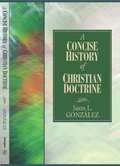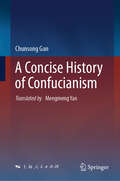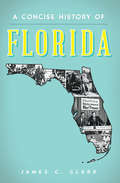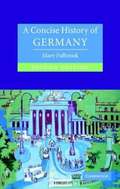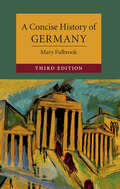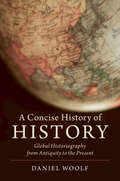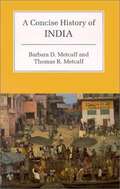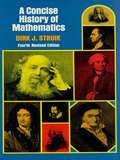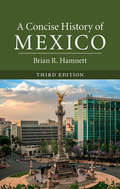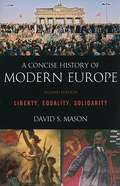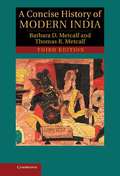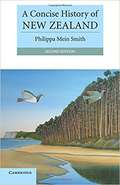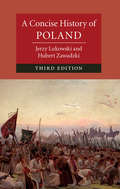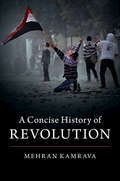- Table View
- List View
A Concise History of Christian Doctrine
by Justo L. GonzalezAn introduction to the core Christian doctrines, the historical context in which they arose, and their ongoing importance to contemporary Christian belief and practice.Justo González has long been recognized as one of our best teachers and interpreters of the church’s belief and history. In this new volume he lays out the answers to three questions crucial to understanding the Christian tradition: First, what are the core Christian doctrines? What ideas and convictions form the heart of Christian identity? Second, Where did these doctrines come from? What are the historical contexts in which they first rose to prominence? How have they developed across the history of the church? Finally, what do these doctrines mean today? What claims do they continue to place on Christian belief and practice in the twenty-first century?Written with the clarity and insight for which González is famous, A Short History of Christian Doctrine will serve the needs of students in church history, historical theology, and systematic theology classes in college/university settings, as well as seminaries/theological schools.
A Concise History of Confucianism
by Chunsong GanThis book is a readable and insightful analytical work that steadily traces and analyzes the historical development of Confucianism in China. This book is structured chronologically and discusses the developing positions of Confucianism across different periods in the Chinese history. Each chapter focuses on a number of key questions and perspectives pertaining to Confucian thoughts and ideas, for example, &‘Benevolence&’ and &‘Propriety&’ in Pre-Qin Confucianism, studies of Mencius and Xunzi, and Dong Zhongshu of the Han Dynasty . In addition, this book pays special and extensive attention to ideas of New Confucianism, its concepts, and formation. This book is written in a simple yet comprehensible style. It aims to broaden and deepen studies of Confucianism via its stage-by-stage discussion about the historical development of Confucian thoughts. Both academic specialists and ordinary readers will find the book helpful and inspiring in its clear and vivid delineation, analysis, and debate about the essence, function, and role of Confucianism in traditional and modern societies alike.
A Concise History of Finland
by David KirbyFew countries in Europe have undergone such rapid social, political and economic changes as Finland has during the last fifty years. David Kirby here sets out the fascinating history of this northern country, for centuries on the east-west divide of Europe, a country not blessed by nature, most of whose inhabitants still earned a living from farming fifty years ago, but which today is one of the most prosperous members of the European Union. He shows how this small country was able not only to survive in peace and war but also to preserve and develop its own highly distinctive identity, neither Scandinavian nor Eastern European. He traces the evolution of the idea of a Finnish national state, from the long centuries as part of the Swedish realm, through self-government within the Russian Empire, and into the stormy and tragic birth of the independent state in the twentieth century.
A Concise History of Florida (Brief History Ser.)
by James C. ClarkA quick overview of the Sunshine State&’s fascinating past, with photos and illustrations included. In 1513, Spanish explorer Juan Ponce de León first set foot on Florida&’s east coast. The land he discovered was a geographic anomaly so distinctive that one day, centuries later, astronaut Neil Armstrong would say that Florida was the first shape on earth he recognized on his return from a visit to the moon. This unique state has witnessed such momentous events as the 1959 arrival of the first Cuban exiles under Fidel Castro and the 1981 launch of the Columbia—the first space shuttle. Join historian James C. Clark as he chronicles the surprising history of the Sunshine State in this concise and captivating book.
A Concise History of France
by Roger PriceThis book provides a clear and well-informed guide to French history from the emergence of a strong state in the Ile-de-France in the early middle ages, to the trente glorieuses following the Second World War and the Mitterrand presidency. As such, it provides the most up-to-date and comprehensive study of French history available. Among the book's central themes are the relationship between state and society, the impact of war and such crucial questions as who possessed political power, how this power was used, in whose interests, and with what consequences. Roger Price examines the role of leading figures including Philip Augustus, Henri IV, Louis XIV, the two Napoleans, Clemenceau and De Gaulle as well as the lives of ordinary people. A rich entertaining guide for the student and general reader.
A Concise History of Germany
by Mary FulbrookA new edition of Mary Fulbrook's history of Germany from the middle ages to today.
A Concise History of Germany
by Mary FulbrookThis book provides a clear and informative guide to the twists and turns of German history from the early middle ages to the present day. The multi-faceted, problematic history of the German lands has provided a wide range of debates and differences of interpretation. Mary Fulbrook provides a crisp synthesis of a vast array of historical material, and explores the interrelationships between social, political and cultural factors in the light of scholarly controversies. First published in 1990, A Concise History of Germany appeared in an updated edition in 1992, and in a second edition in 2004. It is the only single-volume history of Germany in English which offers a broad, general coverage. It has become standard reading for all students of German, European studies and history, and is a useful guide to general readers, members of the business community and travellers to Germany.
A Concise History of Germany (Cambridge Concise Histories)
by Mary FulbrookThis third edition of Mary Fulbrook's much-admired and popular introduction to German history provides a clear and informative guide to the twists and turns of the story of the German lands and peoples from the early middle ages to the present day. Crisply synthesising a vast array of historical material, Fulbrook explores the interrelationships between social, political and cultural factors in the light of scholarly controversies. Since the second edition in 2004, there have been important changes in Germany, Europe and the wider world. This new edition features a significantly expanded chapter on Germany since 1990, encapsulating recent and dramatic developments that have transformed Germany's character and international standing. This single-volume history of Germany offers broad and accessible coverage and provides a useful guide for students, general readers, travellers to Germany and anyone with an interest in German history.
A Concise History of Greece
by Richard CloggThis book provides a concise, illustrated introduction to the history of modern Greece, from the first stirrings of the national movement in the late eighteenth century to the present day. It is designed to provide a basic introduction for general and academic readers with little or no prior knowledge of the subject, and supersedes Professor Clogg's Short History of Modern Greece which has become a classic since its initial publication in 1979. This latest account is a wholly new book, conceived afresh for a broad readership, in which the many illustrations with their extensive captions form an important part of the text.
A Concise History of History: Global Historiography from Antiquity to the Present (Cambridge Concise Histories Ser.)
by Daniel WoolfThis short history of history is an ideal introduction for those studying or teaching the subject as part of courses on the historian's craft, historical theory and method, and historiography. Spanning the earliest known forms of historical writing in the ancient Near East right through to the present and covering developments in Europe, Asia, Africa and the Americas, it also touches on the latest topics and debates in the field, such as 'Big History', 'Deep History' and the impact of the electronic age. It features timelines listing major dynasties or regimes throughout the world alongside historiographical developments; guides to key thinkers and seminal historical works; further reading; a glossary of terms; and sample questions to promote further debate at the end of each chapter. This is a truly global account of the process of progressive intercultural contact that led to the hegemony of Western historiographical methods.
A Concise History of Hungary
by Miklós MolnárThis book offers a comprehensive thousand-year history of the land, people, society, culture and economy of Hungary, from its nebulous origins in the Ural Mountains to the 1988 elections. It tells above all the thrilling story of a people who became a great power in the region and then fought against--and were invaded by--Ottomans, Germans and Soviets. The Hungarian people preserved nevertheless a continuous individuality through their Ural-born language and a specifically Hungaro-European culture.
A Concise History of India
by Barbara D. Metcalf Thomas R. MetcalfA concise history of India since the time of the Mughals comprising the history of British India from the late eighteenth century until 1947, when the subcontinent was split into the two independent countries of India and Pakistan, and of the Republic of India thereafter.
A Concise History of Italy
by Christopher DugganSince its creation in 1861, Italy has struggled to develop an effective political system and a secure sense of national identity. This concise history, which covers the period from the fall of the Roman empire in the west to the present day, looks in particular at the difficulties Italy has faced during the last two centuries in forging a nation state. The opening chapters consider the geographical and cultural obstacles to unity, and survey the long centuries of political fragmentation in the peninsula since the sixth century. It was this legacy of fragmentation which Italy's new rulers had to strive to overcome when the country became united, more by accident than design, in 1859–61. The book aims to weave together political, economic, social and cultural history, and stresses in particular the alternation between materialist and idealist programmes for forging a nation state.
A Concise History of Japan
by Brett L. WalkerTo this day, Japan's modern ascendancy challenges many assumptions about world history, particularly theories regarding the rise of the west and why the modern world looks the way it does. In this engaging new history, Brett L. Walker tackles key themes regarding Japan's relationships with its minorities, state and economic development, and the uses of science and medicine. The book begins by tracing the country's early history through archaeological remains, before proceeding to explore life in the imperial court, the rise of the samurai, civil conflict, encounters with Europe, and the advent of modernity and empire. Integrating the pageantry of a unique nation's history with today's environmental concerns, Walker's vibrant and accessible new narrative then follows Japan's ascension from the ashes of World War II into the thriving nation of today. It is a history for our times, posing important questions regarding how we should situate a nation's history in an age of environmental and climatological uncertainties.
A Concise History of Mathematics: Fourth Revised Edition (Dover Books on Mathematics)
by Dirk J. StruikThis compact, well-written history -- first published in 1948, and now in its fourth revised edition -- describes the main trends in the development of all fields of mathematics from the first available records to the middle of the 20th century. Students, researchers, historians, specialists -- in short, everyone with an interest in mathematics -- will find it engrossing and stimulating.Beginning with the ancient Near East, the author traces the ideas and techniques developed in Egypt, Babylonia, China, and Arabia, looking into such manuscripts as the Egyptian Papyrus Rhind, the Ten Classics of China, and the Siddhantas of India. He considers Greek and Roman developments from their beginnings in Ionian rationalism to the fall of Constantinople; covers medieval European ideas and Renaissance trends; analyzes 17th- and 18th-century contributions; and offers an illuminating exposition of 19th century concepts. Every important figure in mathematical history is dealt with -- Euclid, Archimedes, Diophantus, Omar Khayyam, Boethius, Fermat, Pascal, Newton, Leibniz, Fourier, Gauss, Riemann, Cantor, and many others. For this latest edition, Dr. Struik has both revised and updated the existing text, and also added a new chapter on the mathematics of the first half of the 20th century. Concise coverage is given to set theory, the influence of relativity and quantum theory, tensor calculus, the Lebesgue integral, the calculus of variations, and other important ideas and concepts. The book concludes with the beginnings of the computer era and the seminal work of von Neumann, Turing, Wiener, and others."The author's ability as a first-class historian as well as an able mathematician has enabled him to produce a work which is unquestionably one of the best." -- Nature Magazine.
A Concise History of Mexico
by Brian R. HamnettMexico's fascinating complexities are difficult to approach. This illustrated Concise History begins with a brief examination of contemporary issues, while the book as a whole - ranging from the Olmecs to the present day - combines a chronological and thematic approach while highlighting long-term issues and controversies. Modern Mexico, founded after independence from Spain in 1821, was created out of a long and disparate historical inheritance which has constantly influenced its evolution. This book takes account of that past and pays attention to the pre-Columbian and Spanish colonial influence. Mexico's economic problems are given historical treatment together with political analysis and attention to social and cultural factors. The book's prime objective is accessibility to readers, including those interested in gaining a broad general knowledge of the country and those across the professions anxious to secure a rapid but secure understanding of a subject where there are few starting points.
A Concise History of Mexico (Cambridge Concise Histories)
by Brian R. HamnettThis concise history looks at Mexico from political, economic, and cultural perspectives, portraying Mexico's struggle to break out of the colonial past and assert its viability as a sovereign state in a competitive world. In this third edition, Hamnett adds new material on Mexico's regional and international roles as they have emerged in the twenty-first century, including membership of supra-national organizations (including and moving beyond NAFTA), the Mexican drug war between government officials and gangs, and the immigration and border crises within the United States. He also discusses Mexico's relationship to the outside world, particularly its efforts to broaden the range of political and commercial associations, especially with European countries, the rest of Latin America, and the Pacific Rim through trade agreements with supra-national organizations.
A Concise History of Modern Europe: Liberty, Equality, Solidarity
by David S. MasonHighlighting the key events, ideas, and individuals that have shaped modern Europe, this fresh and lively book provides a succinct history of the continent from the Enlightenment to the present. Drawing on the enduring theme of revolution, David S. Mason explores the causes and consequences of revolution: political, economic, and scientific; the development of human rights; and issues of European identity and integration. He deliberately avoids a detailed chronology of every country and time period by emphasizing the most crucial events in shaping contemporary Europe. Fourteen focused chapters address such topical issues as the Enlightenment; the French Revolution and Napoleon; the Industrial Revolution; the theories and impact of Marx and Darwin; the revolutions of 1848, 1917, and 1989; the unifications of Germany and Italy; European imperialism; the two World Wars; the Cold War and decolonization; and the evolution and expansion of the European Union. Any reader needing a broad overview of the sweep of European history since 1789 will find this book, published in a first edition under the title Revolutionary Europe, an engaging and cohesive narrative.
A Concise History of Modern India
by Barbara D. Metcalf Thomas R. MetcalfA Concise History of Modern India, by Barbara D. Metcalf and Thomas R. Metcalf, has become a classic in the field since it was first published in 2001. As a fresh interpretation of Indian history from the Mughals to the present, it has informed students across the world. In the third edition of the book, a final chapter charts the dramatic developments of the last twenty years, from 1990 through the Congress electoral victory of 2009, to the rise of the Indian high-tech industry in a country still troubled by poverty and political unrest. The narrative focuses on the fundamentally political theme of the imaginative and institutional structures that have successively sustained and transformed India, first under British colonial rule and then, after 1947, as an independent country. Woven into the larger political narrative is an account of India's social and economic development, and its rich cultural life. Throughout, the authors argue that despite a powerful historiographical tradition to the contrary, no enduring meaning can be given to categories such as 'caste', 'Hindu', 'Muslim', or even 'India'.
A Concise History of New Zealand
by Philippa Mein SmithNew Zealand was the last major landmass, other than Antarctica, to be settled by humans. The story of this rugged and dynamic land is beautifully narrated, from its origins in Gondwana some 80 million years ago to the twenty-first century. Philippa Mein Smith highlights the effects of the country's smallness and isolation, from its late settlement by Polynesian voyagers and colonisation by Europeans – and the exchanges that made these people Maori and Pakeha – to the dramatic struggles over land and recent efforts to manage global forces. A Concise History of New Zealand places New Zealand in its global and regional context. It unravels key moments – the signing of the Treaty of Waitangi, the Anzac landing at Gallipoli, the sinking of the Rainbow Warrior – showing their role as nation-building myths and connecting them with the less dramatic forces, economic and social, that have shaped contemporary New Zealand.
A Concise History of Poland (Cambridge Concise Histories Ser.)
by Jerzy Lukowski Hubert ZawadzkiPoland is a tenacious survivor-state: it was wiped off the map in 1795, resurrected after the First World War, apparently annihilated again in the Second, and reduced to satellite status of the Soviet Union after 1945. Yet it emerged in the vanguard of resistance to the USSR in the 1980s, albeit as a much more homogeneous entity than it had been in its multi-ethnic past. This book outlines Poland's turbulent and complex history, from its medieval Christian origins to the reassertion of that Christian and European heritage after forty-five years of communism. It describes Poland's transformation since 1989, and explains how Poland navigated its way into a new Commonwealth of Nations in the European Union. Recent years have witnessed significant changes within Poland, Eastern Europe and the wider world. This new edition reflects on these changes, and examines the current issues facing a Poland which some would accuse of being out of touch with 'European values'.
A Concise History of Poland: Second Edition
by Jerzy Lukowski Hubert ZawadzkiThe second edition of this guide to Poland has been updated to take account of the years from 1989-2005. This period marked its liberation from the Soviet Union, the birth of Poland's 'Third Republic' and, recently, its accession to the European Union in 2004. Poland's history has been marked by its resilience. Once a dominant force in central and eastern Europe and home to a remarkable experiment in consensual politics, it was excised from the map by its neighbours in 1795. Resurrected in 1918, partitioned afresh during the Second World War, it survived to become a satellite of the Soviet Union. Yet in the 1980s, it was Poland which blazed the trail in casting off communism, and was finally able to reassert its Christian heritage. With its updated bibliography and new chronology, the book is the ideal companion for all looking for a comprehensive survey of this fascinating country.
A Concise History of Portugal
by David BirminghamThis concise, illustrated history of Portugal presents an introduction to the people and culture of the country and its search for economic modernization, political stability and international partnership. The first single-volume account of Portugal's history since the days of dictatorship and colonization, this updated second edition also covers the state of historical writing on Portugal at the turn of the millennium. First Edition Hb (1993): 0-521-43308-8 First Edition Pb (1993): 0-521-43880-2 David Birmingham is a Professor of Modern History at the University of Kent, Canterbury. He has written extensively on Portugal and Africa including, among others, The Decolonization of Africa (UCL Press, 1995), History of Central Africa, Volume Three (Longman, 1998), and Portugal and Africa (Macmillan, 1999) and, more recently, a survey of Trade and Empire in the Atlantic, 1400-1600 (Routledge, 2000).
A Concise History of Portugal (Cambridge Concise Histories )
by David BirminghamThis concise, illustrated history of Portugal offers an introduction to the people and culture of the country, its empire, and its search for economic modernisation, political stability and international partnership. It remains the standard single-volume work on Portugal, studying the effects of the vast wealth mined from Portuguese Brazil, the growth of the wine trade, and the evolution of international ties. <P><P>The Portuguese Revolution of 1820 to 1851 created a liberal monarchy, but in 1910 the king was overthrown and, by 1926, had been replaced by a dictatorship. In 1975, Portugal withdrew from its African colonies and looked north to become a democratic member of the European Community in 1986. This third edition brings the story up to date, with a new afterword to reflect recent changes in Portugal, Europe, and the wider world.<P> A new edition of David Birmingham's classic account of Portuguese history from the early medieval period to the present day.<P> The book is already established as the most reliable and accessible single-volume history of modern Portugal in print.<P> Brings the story up-to-date by discussing the recent changes in Portugal, Europe, and the wider world.
A Concise History of Revolution
by Mehran KamravaPresenting a new framework for the study of revolutions, this innovative exploration of French, Russian, Chinese, Vietnamese, Cuban, Iranian, South African, and more recent Arab revolutions, provides a theoretically grounded and empirically comprehensive demonstration of how revolutions mean more than mere state collapse and rebuilding. Through the examination of multiple historical case studies, and use of extensive historical examples to explore a range of revolutions, Mehran Kamrava reveals the range and depth of human emotion and motivations that are so prevalent and consequential in revolutions, from personal commitment to sacrifice, determination, leadership ability, charisma, opportunism, and avarice.
